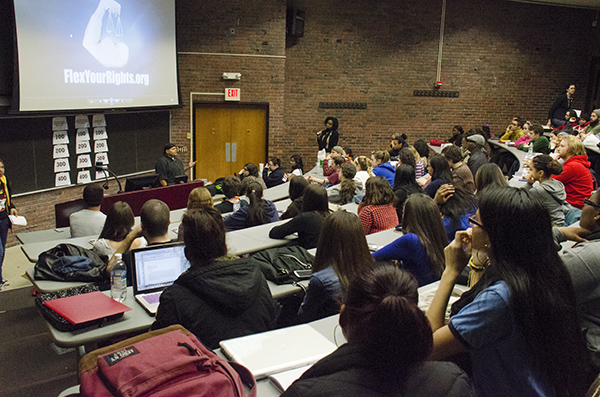
The Student Association (SA), New York Students Rising, the Department of Sociology, the Black Student Union and Students for a Sensible Drug Policy recently collaborated to inform students of their rights.
The second Know Your Rights Training of the school year was held on Monday, March 11 in Lecture Center 104.
After last semester’s forum featuring lawyers Andrew and Victoria Kossover yielded a positive response from students, SA Executive Vice President Manuel Tejada decided to schedule the program on a semester basis.
“This semester, we put it out to a larger student population,” Tejada said. “It was collaborative and very informative. Students need to understand the legal rights they have when dealing with police.”
The presenters, Chino Hardin from the Center for NULeadership, and Kassandra Frederique from the Drug Policy Alliance, addressed a crowd of close to 100 students in an informal, conversational manner.
After showing a video on police encounters, they played a jeopardy-style game that tested students’ knowledge of their rights when being approached by law enforcers. Each jeopardy-style question allowed for a dialogue between students and the presenters, and the conversation made students feel like they weren’t being lectured on their rights, Tejada said.
“People have more ownership over the information if they can interact with it,” Hardin said. “Students are part of the community and they will eventually be in those positions to make social changes and they should be knowledgeable of their human rights.”
The training session focused mainly on illegal stop and frisk encounters and the overwhelming amount of marijuana arrests in New York City. The Center for NULeadership works in collaboration with Vocal New York and the Drug Policy Alliance on a larger campaign to inform people of their legal and constitutional rights. They offer the Know Your Rights training workshop series in New York City, focusing on low-income areas and areas with a high number of marijuana arrests.
According to Tejada, this topic is relevant to students because of the increasing number of marijuana-related incidents on campus, and some students who have encountered University Police may have handled things differently had they known their rights.
“Whether it’s NYPD or UPD, they’re a police unit and there’s tension between students,” Tejada said. “Some students feel that they’re looking over us rather than looking out for us.”
Assistant Professor of sociology, Alexandra Cox, has been working in conjunction with SA to hold the Know Your Rights program, and said she encourages her students to attend and write about it for credit.
“The people presenting were real with the students and students were able to get concrete information about their rights, and learn more about marijuana law enforcement,” Cox said. “This information is important because students are stopped or pulled over by police all the time and they have the power to let other young people know their rights as well, and keeping them informed will help them advocate for themselves.”
Hardin said even students who have previously attended the workshop can retain new information by returning each semester it’s offered. She said there are multiple parts to the training session, but it often has to be sliced down due to time constraints.
“We’ve been doing this workshop for a couple of years and there’s something interactive and informational for everyone,” Hardin said. “People can learn something new from these workshops every time they attend, and the rights they learn about are applicable wherever they are.”

